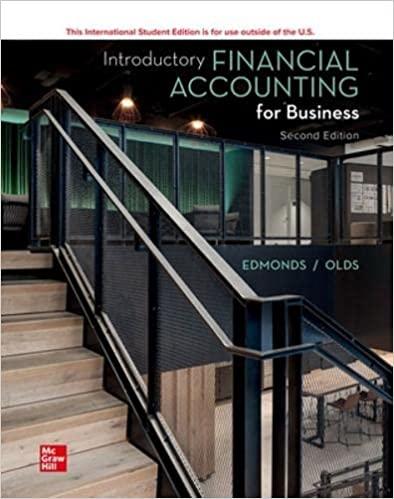Question
Suppose that, at time t = 0 (now), 100 depositors (householders) deposit $3,000 each to a fictitious bank, call it OUR Bank. The deposits have
Suppose that, at time t = 0 (now), 100 depositors (householders) deposit $3,000 each to a fictitious bank, call it OUR Bank. The deposits have one-year maturity and the bank pays 3% annual interest rate. The OUR Bank pools all the deposits, and lends $100,000 each to THREE corporations. The loan terms are following: Maturity = 6 years, and Interest rate is 6% simple interest; it is the "Interest ONLY" loan for the maturity of loan. In other words, the principal amount has to be repaid at the end of the loan maturity of six years. In addition, the owners have put $5,000 of equity capital. For exposition, we will make additional assumptions: No taxes, no dividend payments, no time value of money (bank will not reinvest the net interest income). The OUR Bank will cease to exist after six years.
Relax the second assumption of Problem 1. The other two assumptions remain the same. In other words, make the following assumptions: (1) Short-term (one-year) interest rate remains at 3% per annum for the next six years. (2) One of the borrowers default on loan obligations, both principal and interest, in year 6. The recovery rate is zero percent. (3) All depositors renew their one-year deposits throughout the six years, but consume the interest payments. In other words, no principal withdrawals and no addition of principal from the depositors for the next six years.
Assuming, no bailout or other equity infusion, what will be the amount received by each depositor at the end of year 6, t = 6 year, for her deposit of $3,000 ?
[For clarification: The bank issues loans only at t=0, after that, throughout the next six years, OUR bank is not issuing any additional loan or investing cash for short-term purpose. This clarification is required so that we all have a common correct answer.]
[DO NOT FORGET THE INITIAL EQUITY OF $5,000.]
Step by Step Solution
There are 3 Steps involved in it
Step: 1

Get Instant Access to Expert-Tailored Solutions
See step-by-step solutions with expert insights and AI powered tools for academic success
Step: 2

Step: 3

Ace Your Homework with AI
Get the answers you need in no time with our AI-driven, step-by-step assistance
Get Started


